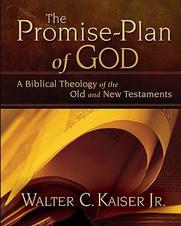 Kaiser promotes that the Promise Plan of God is the constant theme of scripture and begins by showing the origin of that theme in the primeval prologue of Genesis. There it is revealed that in the theology of the Torah, the word “blessing” (which appears in the book of Genesis 88 times alone) represents the promise. Kaiser points out that the God's plan of blessing was universal in nature even before the Genesis 12:3 announcement that “...the role of the patriarchs and their offspring would play in carrying out this mission for 'all the families of the earth'” (Kaiser, 36). God first poured out His blessing universally by creating the world and man in the first place. In addition, we discover that God made man in His own image. Then as if man wasn't indebted enough to God's favor, God blessed man with a mission through His word to “be fruitful and multiply” and to have dominion over all the Earth. Even after man fails God's one test in the Fall (by disobeying the command not to seek knowledge over obedience), God concludes with yet another promise to reverse the separation of the curse – the protoevangelium, or the promise of the “seed” of the woman that would be fulfilled in Jesus Christ. Again, when the wickedness of man increased beyond restoration and the flood erased all mankind but Noah's family from the earth, God promised to be with His people by dwelling in the tents of Shem. God repeated His command to Noah's family to “fruitful and multiply and fill the earth,” but Ham's disobedience resulted in the narrowing of which lineage the promised seed would come from. Then the cycle of rebellion and blessing repeats itself a third time when the peoples of the world seek to “...preserve their unity around some architectural symbol” (Kaiser, 47) instead of multiplying across the face of the whole earth (Genesis 11:4). God disrupted the construction of the Tower of Babel by cursing the people with confused languages, but later appeared to Abraham (a descendant of Shem) with the renewed promise of worldwide blessing through his descendants (Genesis 12:3). The content of this blessing is laid out the Patriarchal Era of Genesis with three components: a seed, a land and a blessing to all the nations. Kaiser explains that the promised “seed” refers to both a singular individual (the Messiah) and the plural of God's people (the Israelite nation). This nation receives the promised inheritance of the land of Israel where the nations of the world would come and see the one true God. This led to the third promise of their heritage, a heritage which would bless the nations. However, God's promises retained conditions which required the Israelites to remain faithfully obedient to God, or else “...the patriarch would become a mere transmitter of the blessing without personally inheriting any of its gifts directly” (Kaiser, 61). While the personal gifts varied throughout Old Testament history, the transmission of that blessing was passed until culminating in the Messiah for all nations, the person of Jesus Christ. Personal Observations - Kaiser's analysis of the promise-plan throughout Genesis addresses controversial passages of scripture, stopping to address alternative viewpoints before continuing with the blessings theme. The days of creation theories of theistic evolution and literal day creationism are gently set-aside as implausible with textual exegesis on the Hebrew verb “bara,” Adam's loneliness, and genealogical calculations; however, Kaiser sadly does not go on to promote a creation stance. Kaiser's exegesis of Adam & Eve also lays a solid foundation for New Testament texts on man in the image of God, the role of men & women, and man's purpose on Earth. The Fall is also handled exegetically to show the literal & metaphoric uses of the serpent in reference to the devil to ultimately reveal that “if any blessing was to come from any place, it would be from God” (Kaiser 43). Kaiser's stance on the Nephilim's evil and God's future dwelling among the tents of Shem is also advantageous. God's word of blessings flow into the three patriarchs of Genesis, but with little ground work for the covenants that govern much of the Old Testament. The inclusion of Job in the patriarchal period is fitting, but the promotion of the name “El Shaddai” for God as a sign of God's promise may lack emphasis for those unfamiliar with the many titles for God. Physical proximity leading to prosperity is more helpful in promoting the blessing theme in Job, but lends itself to the modern abuse of eisegesis.
1 Comment
Cary Fuller
10/22/2015 06:44:50 pm
Very helpful summary.
Reply
Leave a Reply. |
AuthorBrett Yardley: Categories
All
Archives
January 2019
|

